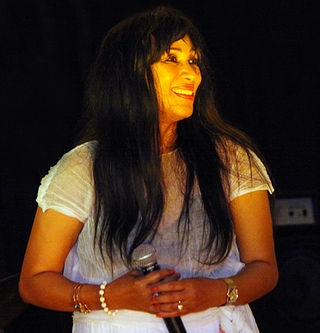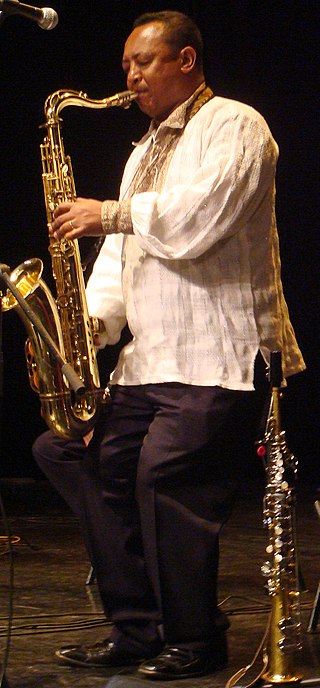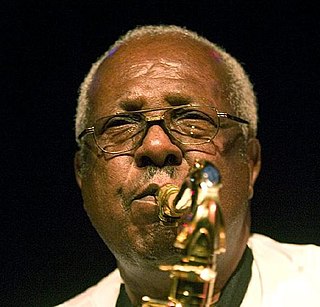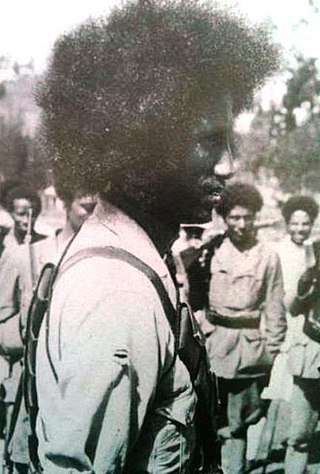Ethiopian music is a term that can mean any music of Ethiopian origin, however, often it is applied to a genre, a distinct modal system that is pentatonic, with characteristically long intervals between some notes.

Aster Aweke is an Ethiopian singer who sings in Amharic. Aster's voice has attracted broader public popularity, especially tracing back in 1990s singles and her single "Abebayehosh" in Ethiopian New Year. She is best known for her 1999 album Hagere and her 2006 album Fikir. She moved to the United States in 1981, and she returned to Ethiopia in 1997.

Mahmoud Ahmed is an Ethiopian singer. He gained great popularity in Ethiopia in the 1970s and among the Ethiopian diaspora in the 1980s, before rising to international fame with African music fans in Europe and the Americas.
Orchestra Ethiopia was an Ethiopian concert band formed in 1963 by the Egyptian-born American composer and ethnomusicologist Halim El-Dabh. The group, which was founded in Addis Ababa, comprised up to 30 traditional instrumentalists, vocalists, and dancers from many different Ethiopian regions and ethnic groups. It was the first ensemble of its type, as these diverse instruments and ethnic groups previously had never played together. For a time, due to El-Dabh's efforts, the Orchestra was in residence at the Creative Arts Centre of Haile Selassie I University.

Abatte Barihun is an Israeli jazz saxophonist and composer. His sound is reminiscent of John Coltrane's, who has highly influenced Barihun.

Getatchew Mekurya was an Ethiopian jazz saxophonist.
Finote Selam is a town and separate woreda in western Ethiopia. Located in the Mirab Gojjam Zone of the Amhara Region, by road 387 km from Addis Ababa and 176 km from Bahir Dar. By air, the distance from Addis Ababa is 246 km. Finote Selam, the "Pacific Road", is the name given by Emperor Haile Silassie during the Italian invasion on Ethiopia. Formerly its name was Wojet. Now Finote Selam is the capital city of West Gojjam Zone. This town has a longitude and latitude of 10°42′N37°16′E with an elevation of 1917 meters above sea level.

Belay Zeleke was an Ethiopian military commander who led the Arbegnoch resistance movement in Gojjam against the Fascist Italians during the Italian occupation of Ethiopia from 1936 to 1941. He emerged as a brigand leader after his five-year struggle against Italian rule in Ethiopia.
Walias Band were an Ethiopian jazz and funk band active from the early 1970s until the early 1990s. Formed by members of the Venus Band, Walias backed up many prominent singers with a hard polyrhythmic funk sound influenced by western artists like King Curtis, Junior Walker and Maceo Parker. In 1977 they recorded one of the few albums of Ethiopian instrumental music in collaboration with vibraphonist Mulatu Astatke, whose role as a bandleader and composer was also a major influence on Ethiopian popular music.
Selam Seyoum Woldemariam, also known as Selamino, is an Ethiopian-born Eritrean musician and guitarist. He has turned out 250 albums in his more than forty years as a professional musician. He has been called "The Jimi Hendrix of Ethiopia" and is a national legend.

Y'Anbessaw Tezeta is the second studio album by Ethiopian tenor saxophone player Getatchew Mekuria in collaboration with Dutch punk rock band The Ex and several other musicians. The title is Amharic for "The Memory of the Lion" and Mekurya intended the record to mark the closure of his 65-year career.
Imperial Tiger Orchestra is a Swiss group of modern popular Ethiopian music. Its name hints at the Imperial bodyguard band of the Halie Selassie era and Monty Python’s “Tiger in Africa” sketch It was formed after a jam organized by Genevan trumpet player Raphaël Anker. The band has released three albums and played in Europe, Southern Africa and Ethiopia. It also worked with renowned Ethiopian musicians, like Endress Hassen or the singer Hamelmal Abate.
Munit Mesfin is an Ethiopian singer and songwriter best known for working in a duo with German vocalist and guitarist Jӧrg Pfeil. Munit sings in her mother tongue Amharic and English, with inspiration from traditional Ethiopian songs. Some of her music includes vocalization without words. Mesfin has a focus on social issues and female empowerment.

Zeritu Kebede is an Ethiopian singer, songwriter and actress. A prominent figure in modern Ethiopian music, her songs often incorporate rock and gospel music.

Debo Band are a Boston-based Ethiopian music band led by saxophonist Danny Mekonnen and fronted by vocalist Bruck Tesfaye. Ranging from 10–12 members playing horns, guitars, violins, percussion, and accordion, their sound incorporates Ethiojazz, folk, and pop styles from the Horn of Africa infused with tinges of motifs from Eastern Europe and Asia, as well as punk, experimental, and psychedelic rock. Rolling Stone described Debo's sound as, "guitar solos, massed vocals, violin and brass [that] rush in like a Red Bulled marching band...Dance at your own risk."
Selam Tesfaye is an Ethiopian film actress. Her roles often placed her as a leading actress in various films. As recipient of multiple awards, notably Gumma Film Awards, she is one of the most popular icon in the Ethiopian film industry.

27 passports is a 2018 album by the Dutch band The Ex. It is the group's first studio album in five years since Enormous Door, their 2013 collaboration with Brass Unbound, and The Ex's first album of all new material since 2010's Catch My Shoe.

Eténèsh Wassié is an Ethiopian jazz singer, renowned for her collaborative approach to music and performance.
Teshome Mitiku is an Ethiopian singer and saxophonist. He is the father of Swedish singer Emilia and brother of saxophonist Theodros Mitiku. He was leader of Soul Ekos Band active in 1960s.













